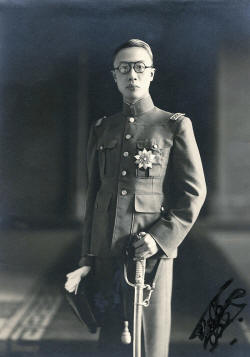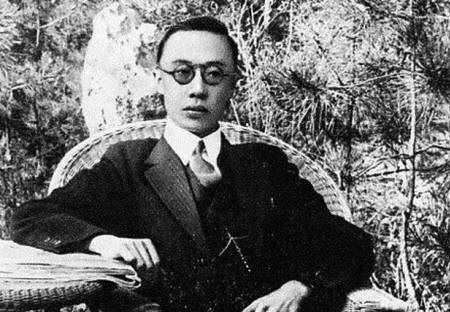Queer Places:
Salt Tax Palace
Hualong Imperial Cemetery
Yixian, Hebei, China
 Puyi (7 February 1906 – 17 October 1967) was the last Emperor of China as the eleventh and final Qing dynasty ruler. Becoming the Xuantong Emperor at age two but forced to abdicate on 12 February 1912 due to the Xinhai Revolution, he later served as the nominal ruler of the Japanese puppet state of Manchukuo during World War II.
Puyi (7 February 1906 – 17 October 1967) was the last Emperor of China as the eleventh and final Qing dynasty ruler. Becoming the Xuantong Emperor at age two but forced to abdicate on 12 February 1912 due to the Xinhai Revolution, he later served as the nominal ruler of the Japanese puppet state of Manchukuo during World War II.
He was briefly restored to the throne as Qing emperor by the loyalist General Zhang Xun from 1 July to 12 July 1917. He was first wed to Empress Wanrong in 1922 in an arranged marriage. Of Puyi's failure to consummate his marriage on his wedding night, Behr wrote:
It was perhaps too much to expect an adolescent, permanently surrounded by eunuchs, to show the sexual maturity of a normal seventeen-year-old. Neither the Dowager consorts nor Johnston himself had given him any advice on sexual matters – this sort of thing simply was not done, where emperors were concerned: it would have been an appalling breach of protocol. But the fact remains that a totally inexperienced, over-sheltered adolescent, if normal, could hardly have failed to be aroused by Wan Jung's [Wanrong's] unusual, sensual beauty. The inference is, of course, that Pu Yi was either impotent, extraordinarily immature sexually, or already aware of his homosexual tendencies.[71]
In 1924, he was expelled from the palace and found refuge in Tianjin, where he began to court both the warlords fighting for hegemony over China, and the Japanese who had long desired control of China. In 1932, after the Japanese invasion of Manchuria, the puppet state of Manchukuo was established by Japan and he was chosen to become "Emperor" of the new state using the era-name of Datong (Ta-tung).
In 1934, he was declared the Kangde Emperor (or Kang-te Emperor) of Manchukuo and ruled the nation until the end of the Second Sino-Japanese War in 1945. This third stint as Emperor saw him as a puppet of Japan; he signed most edicts the Japanese gave him, including one making slavery legal. During this period, he was largely cooped up in the Salt Tax Palace, where he regularly ordered his servants beaten.

Puyi became a devoted Buddhist, a mystic and a vegetarian, having statues of the Buddha put up all over the Salt Tax Palace for him to pray to while banning his staff from eating meat.[173] His Buddhism led him to ban his staff from killing insects or mice, but if he found any insects or mice droppings in his food, the cooks were flogged.[173] One day, when out for a stroll in the gardens, Puyi found that a servant had written in chalk on one of the rocks: "Haven't the Japanese humiliated you enough?"[176] When Puyi received guests at the Salt Tax Palace, he gave them long lectures on the "glorious" history of the Qing as a form of masochism, comparing the great Qing Emperors with himself, a miserable man living as a prisoner in his own palace.[177] Wanrong, who detested her husband, liked to mock him behind his back by performing skits before the servants by putting on dark glasses and imitating Puyi's jerky movements.[178] During his time in Tianjin, Puyi had started wearing dark glasses at all times, as during the interwar period wearing dark glasses in Tianjin was a way of signifying one was a homosexual or bisexual.[178]
When Behr questioned him about Puyi's sexuality, Prince Pujie said he was "biologically incapable of reproduction", a polite way of saying someone is gay in China.[186] When one of Puyi's pageboys fled the Salt Tax Palace to escape his homosexual advances, Puyi ordered that he be given an especially harsh flogging, which caused the boy's death and led Puyi to have the floggers flogged in turn as punishment.[174]
His first wife's opium addiction consumed her during these years, and they were generally distant. He took on numerous concubines, as well as male lovers. With the fall of Japan, and thus Manchukuo, in 1945, Puyi fled the capital and was eventually captured by the USSR; he was extradited to the People's Republic of China after it was established in 1949. After his capture he would never see his first wife again; she died of starvation in a Chinese prison in 1946.
Puyi was a defendant at the Tokyo Trials, and imprisoned as a war criminal for 10 years. He escaped execution because Mao Zedong realized that Puyi was more valuable as a reformed commoner than a murdered emperor. After his "reeducation" in prison, he wrote his memoirs (with the help of a ghost writer) and became a titular member of the Chinese People's Political Consultative Conference and the National People's Congress. His time in prison greatly changed him, and he became much kinder and expressed deep regret for his actions while Emperor. In 1962 he married a commoner, Li Shuxian, whom he had a deep affection for.
He died in 1967, and was ultimately buried near the Western Qing tombs in a commercial cemetery.
My published books:


BACK TO HOME PAGE

- Puyi - Wikipedia
- Gay and Lesbian Library Service, edited by Carl Gough and Ellen
Greenblatt
 Puyi (7 February 1906 – 17 October 1967) was the last Emperor of China as the eleventh and final Qing dynasty ruler. Becoming the Xuantong Emperor at age two but forced to abdicate on 12 February 1912 due to the Xinhai Revolution, he later served as the nominal ruler of the Japanese puppet state of Manchukuo during World War II.
Puyi (7 February 1906 – 17 October 1967) was the last Emperor of China as the eleventh and final Qing dynasty ruler. Becoming the Xuantong Emperor at age two but forced to abdicate on 12 February 1912 due to the Xinhai Revolution, he later served as the nominal ruler of the Japanese puppet state of Manchukuo during World War II.


